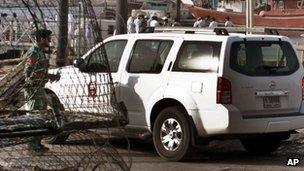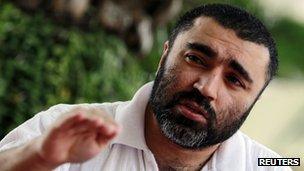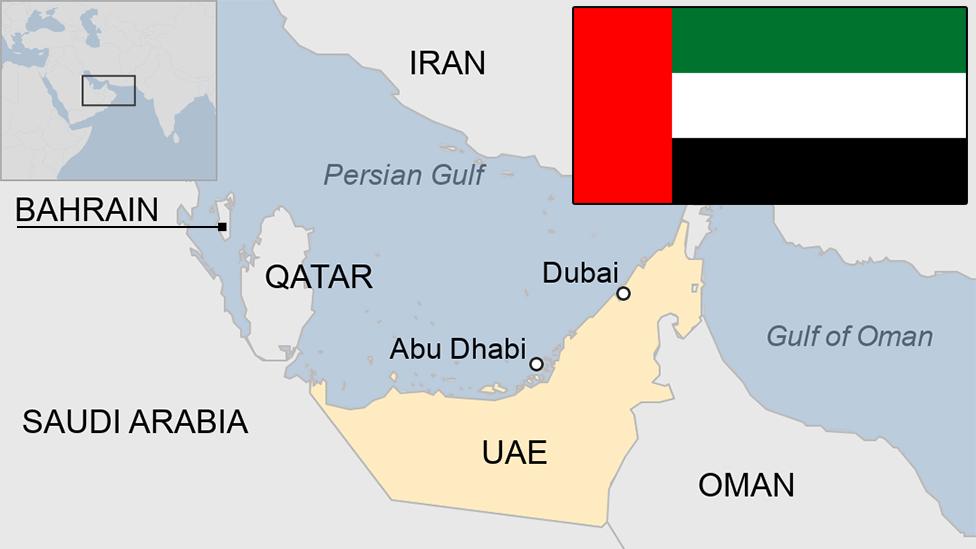UAE urged to release opposition activists
- Published

Dubai's police chief says the Muslim Brotherhood has been discussing "toppling Gulf regimes"
An Islamist group in the United Arab Emirates has called on the authorities to release dozens of opposition activists arrested in recent months.
Islah said the detention of 41 UAE citizens had had a "bad impact on the reputation of the state".
The group insisted the activists were the victims of "false accusations".
At least 20 were held after officials said on 15 July that they had uncovered a foreign-linked group plotting "crimes against state security".
Many of those now in "preventive custody" are affiliated with Islah.
The UAE has so far not seen a pro-democracy uprising like those in Egypt and Tunisia, where Islamist groups have subsequently come to power, though no political parties or demonstrations are permitted.
'Patriotic'
In a statement published on its website on Monday, the Reform and Social Guidance Association (Islah) - a local group that advocates grater adherence to Islamic precepts - affirmed its loyalty to the UAE.
"[Islah] has sought to support [the UAE] since its foundation... then we see that they incorrectly accuse Islah figures of harming state security!?
"We demand the release of the prisoners and a stop to the proceedings and all the security practices and pressures on the sons of the nation."
The activists were all "known for being patriotic", Islah added.
Those arrested between 16 and 19 July reportedly include Hamad Roqait, one of the founders of Islah and a prominent figure in Sharjah; Abdul Rahim al-Zaruni, who worked for a media organisation; Issa al-Suwaidi, a former education official; bloggers Khalifa al-Nuaimi, Rashid al-Shamsi, Omran al-Radhwan, and the lawyers Salim al-Shehhi, Mohammed al-Mansoori and Mohammed al-Roken. Many are active members of Islah.
Attorney-General Salem Saeed Kubaish said he had ordered the arrest and investigation of a "group of people for establishing and managing an organisation with the aim of committing crimes against state security".
He also accused the group of having connections with "foreign organisations and outside agendas" and promised to "expose the dimensions of the conspiracy".
On Friday, Dubai's police chief said members of the Muslim Brotherhood had "met people from the Gulf and discussed toppling Gulf regimes".
Lt Gen Dahi Khalfan warned the most influential Islamist movement in the Arab world that it would "lose a lot if they challenge Gulf states".
Deportation
Last week, Reporters Without Borders called on the UAE to release activists and campaigners detained since March.

Stateless activist Ahmed Abdul Khaleq was deported to Thailand earlier this month
Most were signatories of a 2011 petition calling for the Federal National Council, the UAE's advisory council, to be given legislative powers and control over the executive, the international media action group noted.
In November, five other activists were sentenced to between two and three years in prison for "insulting" the UAE's rulers and calling for protests.
They were all pardoned and released the next day, but one of the defendants - Ahmed Abdul Khaleq, who runs a website highlighting the plight of thousands of stateless people living in the Gulf, like himself - was deported to Thailand on 16 July.
The authorities had detained Mr Abdul Khaleq on 22 May without charge or explanation and told him to choose between indefinite imprisonment in Abu Dhabi or exile to one of a list of countries, according to Human Rights Watch. He reportedly agreed to go to Thailand, although he has no connection to the country.
Mr Abdul Khaleq also said he had been pressured to apply for citizenship of the Comoros and that his passport had been issued on 17 May.
The UK-based Emirates Centre for Human Rights says the island nation agreed to grant stateless people in the UAE citizenship after receiving millions of dollars from the Gulf state, but that its government had been unwilling to take Mr Abdul Khaleq.
- Published13 July 2012
- Published28 November 2011
- Published18 July 2011
- Published7 September 2023
